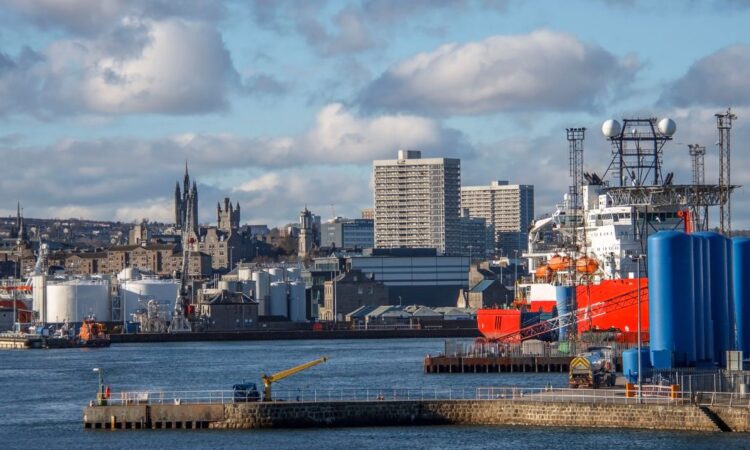
In 2010 Aberdeen was prospering. Of the UK’s 63 Primary Urban Areas, it had the sixth highest disposable income and the 14th highest GVA per hour. Since then, a lot has changed. Between 2010-2021 real Gross Domestic Household Income per head fell by 6.7 per cent, from £23,947 to £22,157. By 2023 Aberdeen was one of only two UK cities that had fewer jobs than in 2010. So, what went wrong in the Granite City?
In short, it was Aberdeen’s over-reliance on the export of North Sea oil and natural gas that is to blame for its poor economic performance over the last decade. Around 30 per cent of jobs in the city’s export base (the part of the economy that trades with other areas of the UK and the world) is directly related to this industry. As a consequence, Aberdeen’s total GVA has tracked changes in the international price of these commodities over the last few decades. And unfortunately for Aberdeen, prices have been falling.
Figure 1: Aberdeen’s GVA was subject to volatile global oil prices
Source: GVA data from the ONS; Oil price data from macrotrends
At the turn of the 2010s the shale gas revolution, driven by the advent of fracking, drastically increased the supply of natural gas. In 2008 the Henry Hub index priced natural gas at $18.49. By 2010 this number fell to $8.26. Today it sits at just $3.25. Over the same period, crude oil production followed a similar trajectory. In 2010 US exports were limited to 1.68 million barrels a day. By 2022 this figure reached 7.5 million. Similarly, Saudi Arabia’s exports grew from 8 million in 2010, peaked at 12 million in 2020, and then came back down to 10 million in 2022. Like natural gas, oil prices also fell. Unlike natural gas, the decline in the price of oil was not evenly distributed across the decade. Instead, reductions in price were concentrated around a few specific periods. Between 2014 and 2015, for example, prices almost halved from $98.97 a barrel to just $53.03.
The decline in fossil fuel prices has had a big impact on Aberdeen’s economy. It is estimated that between 2010-2022 the city lost around 9,000 jobs because of the oil and gas sector’s downturn. At its peak, in 2015, Aberdeen’s oil and gas sector had a real GVA of £6.25 billion. By 2021 this figure had fallen by 45 per cent to £4.3 billion. This occurred at the same time as a broader decline in Aberdeen’s export base which further compounded the shock (see Figure 2).
This shrinking of the city’s export base had a knock-on impact on local services. The retail sector was hit particularly hard: during this period Aberdeen saw a near 30 per cent reduction in retail jobs while the national rate of decline was limited to 6 per cent.
Figure 2: The decline of oil and gas rippled through Aberdeen’s economy
Source: GVA by sector data from the ONS
As the natural gas and oil industry declined, and jobs in local services disappeared, a large number of people began seeking opportunities elsewhere. Things went from bad to worse as net migration plummeted: between 2010 and 2020 there was only one year where this figure managed to stay above zero (see Figure 3).
Figure 3: Emigration out of Aberdeen only made things worse
Source: Migration data from ONS
A total of 14,472 people left the city between 2010 and 2020 – that’s seven per cent of the 2010 population. Much of this was concentrated amongst younger demographics. Between 2010 and 2021 Aberdeen experienced a 16 per cent reduction in its total number of 20-29 year olds. This further weakened Aberdeen’s economy by reducing the demand for local services while limiting the supply of skilled graduates.
Aberdeen’s housing market similarly fell victim as residents saw the value of their homes fall by 15 per cent between 2014 and 2022.
Fortunately for Aberdeen, global changes in the oil and gas industry are likely to provide some respite. Following the war in Ukraine, post-covid OPEC reductions in oil supply, and the issuing of hundreds of new North Sea oil and gas licenses by Westminster, Aberdeen’s fossil fuel-dependent economy is likely to rebound in the near future.
Higher commodity prices will certainly provide some economic relief to a struggling city. However, it is no secret that the city cannot remain dependent on the export of fossil fuels into the future. So, the question that will have been plaguing the minds of Aberdeen’s policy makers for a while now, is what comes next. To this there is no simple answer. However, recent developments in offshore wind and the new economy tech sector are definitely steps in the right direction.
The last decade was undeniably one Aberdonians will be glad to see the back of. It underlines though the risks of being too dependent on one sector. The city will require many engines of prosperity, rather than just one, in order to have a brighter future.






